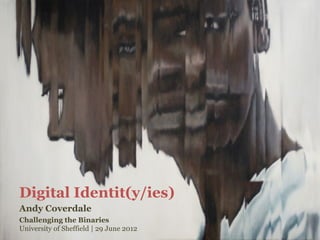Digital Identit(y/ies)
- 1. Digital Identit(y/ies) Andy Coverdale Challenging the Binaries University of Sheffield | 29 June 2012
- 2. Image Jens Hesse | Woman (African) | oil on corduroy (2011) http://www.jenshesse.com Digital Identity SocioÂtechnical and virtuality constructs Identity is âmultiphrenicâ (Gergan, 2000) Identity as reified forms of social and cultural practice
- 3. Doctoral Context PhD as transformative Critical role in the development of an academic / professional identity Positionality â locating oneself in the research âfieldâ âFractured subjectivitiesâ (Barnacle & Mewburn, 2010) Identity and agency
- 4. Based on Usher, R., Bryant, I., & Johnston, R. (1996). Adult Education and the Postmodern Challenge: Learning Beyond the Limits. London: Routledge..
- 5. Identity isâĶ âConfessionalâ Practice âCriticalâ Practice (Modernist) (Postmodernist) Determined by dominant Socially constructed and structures culturally mediated Stable Flexible and in flux Singular and developmental Multiple and fragmentary Unified across multiple Diversified across multiple contexts contexts
- 6. Sociocultural Perspectives Identity as reified forms of perfomativity  social production, interaction and participation Prioritisation, roles and âprovisional selvesâ Situated learning  increased capacity to participate in communities of practice
- 7. Figured Holland, D., Lachicotte, W. Jr., Skinner, D., & Cain, C. (1998). Identity and agency in World â cultural worlds. Cambridge, Mass: Harvard University Press. a socially and culturally constructed realm of interpretation in which particular characters and actors are â recognized, significance is assigned to certain acts, and particular outcomes are valued over others. Holland et al. (1998)
- 8. Research Design _________________________________________ Participants Six PhD students: âĒ Different stages of PhD âĒ Humanities, Soc. Sci. & interdisciplinary âĒ UK-based - âtraditionalâ faculty & DTCs Data Collection 15-month period: âĒ Digital artefacts (blog posts, tweets etc.) âĒ Field notes âĒ Participant-reported accounts âĒ Three interviews with each participant Data Analysis Activity Theory: âĒ Descriptive analytical framework âĒ Open coding and thick description
- 12. Some Findings _____________________________________________ Identity Construction âĒ Cultural artefacts âĒ Genre knowledge and figured worlds Negotiating Practice Contexts âĒ Multiple doctoral research cultures âĒ Peripheral doctoral contexts Authenticity in Digital Contexts âĒ âPrivileged Insightâ âĒ Social, cultural and political dimensions
- 13. Some Findings _____________________________________________ Partiality in Digital Contexts âĒ Partially realised identities âĒ Integrated with other doctoral practices âĒ Dominant cultural practices Ambiguity in Digital Contexts âĒ Interactive vs. broadcast metaphors âĒ Imagined audiences
- 14. Digital Beetham, H., McGill, L., & Littlejohn, A. (2009). Thriving in the 21st century: Literacies Literacies for the digital age (LLiDA Project). The Caledonian Academy. JISC. â (R)ecognising technology practice as diverse and constitutive of personal identity, including identity in different peer, subject and workplace communities, and individual styles of participation. Beetham et al. (2009:3) â
- 15. Thanks Andy Coverdale Blog: http://www.phdblog.net Twitter: @andycoverdale















